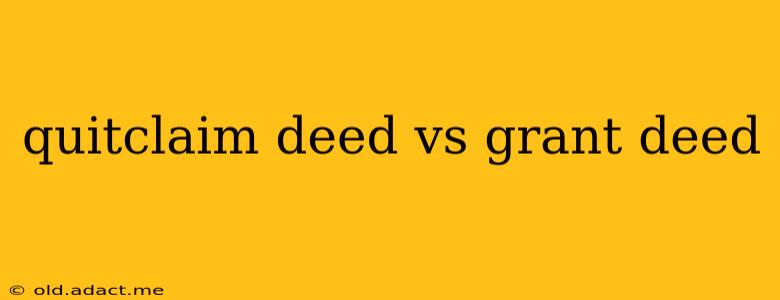Quitclaim Deed vs. Grant Deed: Understanding the Key Differences
Choosing between a quitclaim deed and a grant deed is a crucial decision with significant legal ramifications. Both transfer ownership of real property, but they differ dramatically in the warranties and guarantees offered by the grantor (the person transferring the property). This article will clarify the distinctions, helping you understand which deed is appropriate for your situation.
What is a Quitclaim Deed?
A quitclaim deed is a simple document that transfers whatever interest the grantor currently has in a property to the grantee (the person receiving the property). It makes no guarantees about the quality or extent of that interest. The grantor essentially states, "Whatever I own in this property, I'm giving to you." This means the grantee accepts the property "as is," with all existing defects, liens, or encumbrances.
What is a Grant Deed?
A grant deed, on the other hand, provides the grantee with more protection. It implies that the grantor possesses the right to transfer the property and that the property is free from undisclosed encumbrances (except for those explicitly listed). While not offering the same comprehensive warranties as a warranty deed, a grant deed generally includes two implied warranties:
- Warranty of Seizin: The grantor assures they have the legal right to convey (transfer) the property.
- Warranty Against Encumbrances: The grantor warrants that there are no undisclosed encumbrances (like liens, easements, or other claims) affecting the property's title, other than those specifically listed in the deed.
Key Differences Summarized:
| Feature | Quitclaim Deed | Grant Deed |
|---|---|---|
| Warranties | None | Implied warranties of seizin and against encumbrances |
| Risk | High for the grantee | Lower for the grantee |
| Use Cases | Settling disputes, transferring property with known defects, removing a joint tenant | Typical property sale, gifting property to family members |
| Cost | Typically less expensive to prepare | Slightly more expensive to prepare |
When to Use a Quitclaim Deed?
Quitclaim deeds are most frequently used in situations where:
- A property owner is uncertain of their title: If there's a question about who owns the property, a quitclaim deed might be used to resolve the issue. This is often seen in settling property disputes or clarifying conflicting claims.
- The grantor wants to relinquish all interest: The grantor may want to completely remove themselves from any ownership of the property, regardless of the state of the title.
- Transferring property with known defects: When the grantor knows about defects or liens on the property and wants to transfer it "as is."
When to Use a Grant Deed?
Grant deeds are typically used in:
- Standard property sales: Most real estate transactions utilize grant deeds because they offer a basic level of protection to the buyer.
- Gifts of property: Gifting property to family members frequently involves a grant deed.
- Transfers within a family: Internal family transfers often rely on grant deeds.
What are the potential drawbacks of using a quitclaim deed?
The main drawback of using a quitclaim deed lies in its lack of warranties. The grantee takes on significant risk, as they are responsible for any existing or undiscovered problems with the property's title. They might uncover unforeseen liens, easements, or other title defects only after the transfer. A title search is crucial before accepting a property via a quitclaim deed.
What are the potential drawbacks of using a grant deed?
While offering more protection than a quitclaim deed, a grant deed does not provide full protection against all potential title defects. It only protects against undisclosed encumbrances and does not cover claims that may arise from previous owners' actions. A comprehensive title insurance policy is highly recommended to further protect the grantee.
Do I need a lawyer to use a quitclaim or grant deed?
While not strictly required in all jurisdictions, it is strongly recommended to seek legal counsel before using either a quitclaim or grant deed. A lawyer can help ensure the deed is correctly drafted, legally sound, and protects your interests. The complexities of property law make professional advice invaluable.
This information is for general knowledge and should not be considered legal advice. Always consult with a qualified real estate attorney to determine the appropriate deed for your specific circumstances.
